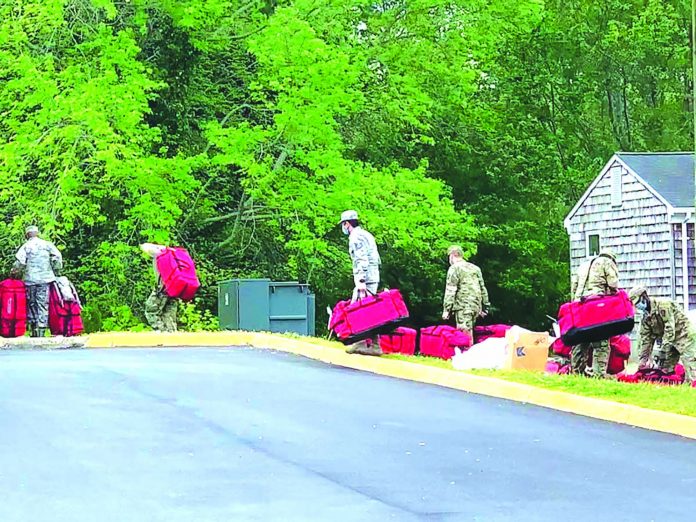
By Carol Vaughn —
Virginia has had 241 outbreaks of COVID-19 in long-term care facilities to date, according to Dr. Laurie Forlano, Virginia Department of Health deputy commissioner for population health.
Forlano and Kimberly Beazley, VDH Office of Licensure and Certification deputy director, briefed the media Thursday on efforts to address coronavirus outbreaks in Virginia nursing homes and assisted living facilities.
“VDH, together with our partners in the long-term care facility stakeholder community remain focused on the response to COVID-19 and have a particular focus on the vulnerable population that lives and works in long-term care facilities,” said Forlano.
Of the total outbreaks, 82 were in skilled nursing facilities or nursing homes and 71 were in assisted living facilities.
The 82 nursing home outbreaks have resulted in at least 3,411 cases and 541 deaths.
The assisted living facility outbreaks have resulted in at least 967 cases and 195 deaths.
Those two types of facilities account for about 40% of all COVID-19 deaths in Virginia, according to Forlano.
“Deaths in nursing homes represent about a third of the deaths in Virginia and if you combine the two, it’s about 40%,” she said.
On the Eastern Shore, out of 10 outbreaks, four have been in long-term care facilities and six have been in congregate settings, according to the VDH.
VDH lists two Shore nursing homes, Shore Healthcare and Rehab Center and Heritage Hall, as having outbreaks. The identity of the other two long-term care facilities with outbreaks is not officially known, but the state’s definition of long-term care facilities in addition to nursing homes and assisted living facilities also includes behavioral healthcare residential facilities, group homes, and multicare facilities.
The VDH recently began releasing outbreak status, case, and death information for nursing homes and assisted living facilities by facility name. The information can be viewed at https://www.vdh.virginia.gov/coronavirus/health-professionals/virginia-long-term-care-task-force/
Twelve cases and zero deaths are associated with an outbreak reported May 4 at Shore Healthcare and Rehab Center, according to the listing.
At Heritage Hall in Nassawadox, 113 cases and 8 deaths were associated with an outbreak reported April 22.
On the Eastern Shore as a whole, 851 COVID-19 cases are associated with the 10 outbreaks, including 104 among healthcare workers. That particular database does not include hospitalization and death information for cases associated with outbreaks.
A task force created to address the virus in Virginia long-term care facilities, which Forlano co-chairs and which includes members from multiple sectors, is focusing on nursing homes and assisted living facilities, although other types of long-term care, including behavioral healthcare residential facilities among others, fall under the definition.
The task force’s job is to advise the state on issues related to long-term care.
“We are working to ensure that long-term care facilities have the resources that they need to combat the virus,” Forlano said, noting that means working to strengthen staffing, testing, supplies, and infection control.
The state health department collects data, reviews trends, provides guidance and advises on infection control and prevention.
“The local health departments are obviously the boots on the ground around the Commonwealth, but we also have two central offices that work closely with these facilities” — the Office of Epidemiology and the Office of Licensure and Certification, Forlano said. “With a pandemic such as this, the information and science and the date changes incredibly rapidly,” Forlano said, adding that can result in the guidance for how to respond changing “as we learn more.”
VDH in mid-June published guidelines for reopening nursing homes and aims to help facilities meet those guidelines.
The guidelines among other measures include recommendations for baseline and repeat testing, largely informed by Centers for Disease Control and Prevention guidance.
VDH has been conducting baseline testing in all nursing homes in the state, with support from the National Guard — with 114 tested, 67 scheduled for testing, and 32 more in the process of being scheduled, and plans to complete testing in 213 facilities by July 15.
Assisted living facilities with outbreaks also are being offered testing.
Additionally, federal Health and Human Services infection prevention and control teams are conducting assessments in Virginia facilities. Twenty were conducted the week of June 25 and 22 more in the last several days, Forlano said.
“We have gotten great feedback on those visits. They are not regulatory In nature; they are intended to be educational and supportive,” she said.
“As demonstrated by this pandemic, a strong infection prevention and control function is critical to protect those residents and personnel,” Forlano said.
Around $246 million in federal funds under the CARES Act will go to help long-term care facilities during the pandemic, including around $56 million for testing.
Forlano said there are no plans to include behavioral healthcare residential facilities, group homes, or other types of long-term care other than nursing homes and assisted living facilities in the database — mainly because the number of residents and case counts at those other types of facilities typically are smaller than at nursing homes and assisted living facilities.
“Our obligation to protect anonymity there would be important and we need to evaluate that,” Forlano said, adding, “The main focus of our desire to share this information was on these more traditional assisted living and nursing homes.”
Beazley in answer to a question from a Post reporter said long-term care ombudsmen employed by the state should be allowed inside nursing homes during the pandemic.
“I have been in touch with the state ombudsman and we had discussed that. CMS (Centers for Medicare and Medicaid Services) has provided information that specifically states that the ombudsman is considered an essential healthcare personnel and if at all possible still should be allowed access into the facility,” she said.


